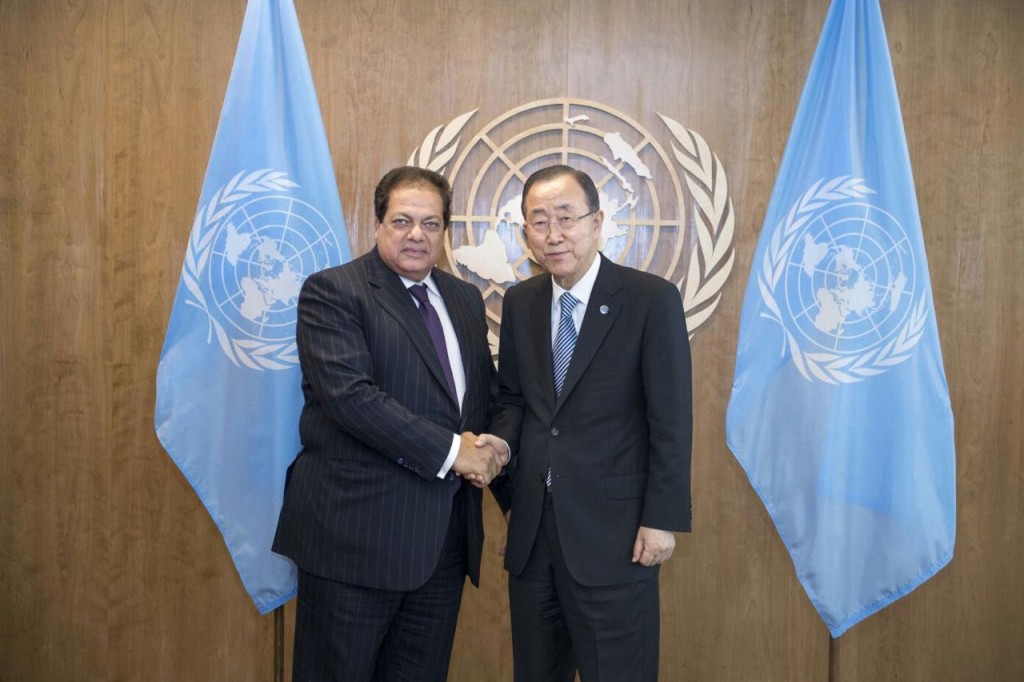
During the meetings of the 71st. Session of UN General Assembly, Honorary President of the Parliamentary Assembly of the Mediterranean, Mr. Mohamed Abou El-Enein, thanked the UN Secretary-General Ban Ki-moon, saying: “You have led the organization and mobilized the leaders’ efforts on a range of major challenges faced by the world, such as the global economic crisis, the climate change, the spread of epidemics, terrorism, as well as new conflicts in the Middle East and the refugee crisis.”
Mr. Abou El-Enein added: “I think you will leave an important legacy for your successor in this important position. At a time when global security, economic and environmental challenges grow, there is a hope for more effective role by the United Nations to face these challenges. Please allow me to talk about the longest and last state of occupation in the world, which is the Israeli occupation of the Palestinian territory in the West Bank and Gaza Strip. Next year will witness the passing of 50 since the occupation took place. The international community is not doing enough effort to resolve this dispute, which is the essence of instability in the Middle East and the world as well.”
Mr. Abou El-Enein pointed out to “the failure of the Security Council many times to fulfill its responsibilities. The last time was in December 30, 2014, when it did not adopt a draft resolution presented by Jordan calling for an end to the Israeli occupation existed since 1967 and achieve a two-state solution within a period not to exceed 12 months.”
He called call for an International Peace Conference under the UN auspices. The aim of this Conference is to put a mechanism and a specific time frame for ending the occupation, in accordance with the UN resolutions and the principle of land for peace and the Arab peace initiative.
He added that “a new draft resolution to be presented to the UN Security Council for the final solution, in the light of the Conference’s results. The new draft resolution will includes a two-state solution, borders demarcation of a Palestinian state on the West Bank, and issues of security, refugees and Jerusalem. Then the Security Council has to issue a resolution on this matter, which will be the declaration of an independent Palestinian state.”
Mr. Abou El-Enein stressed that Israel persists in the lack of respect for international resolutions, particularly the cessation of settlements, because it finds itself with impunity. Thus, the United Nations should take deterrent measures against Israel, as is one of its members, if its failure to comply with international legitimacy continues.
He added that the international community must take the initiative to provide protection for the Palestinian people under occupation. Sending international peacekeeping forces should be considered to secure the Palestinian people from the Israeli forces and the terror of settlers groups.
He added that terrorism is the main threat to international peace and security. In addition, it leads to other no less serious threats such as illegal migration, extremism, xenophobia, human trafficking and antiquities and weapons illegal trade. The United Nations must continue to lead efforts to fight terrorism and adopt a proactive strategy to address its roots and causes and drain its resources.
Mr. Abou El-Enein noted “Terrorism has rebounded in light of the weakness of the state and the collapse of its institutions in some areas such as Libya, Iraq, Yemen and Afghanistan. Our priority must be supporting the state institutions in these countries and in other countries as Egypt, which is fighting on the front lines of the war on terrorism. The international community should provide technical, military and economic aid to enable the state agencies in these countries to eliminate terrorism.
He stressed Egypt has spent more than a year and a half fighting terrorism on its own after the popular revolution in the June 30, 2013, adding that this revolution was against a terrorist group that represents the ideological cloak for all terrorist organizations and religious terrorism in the region.
Mr. Abou El-Enein pointed out to the initiative of President Sisi two years ago and his call to renew the religious discourse, calling upon the world to more support for Egypt and other countries that are fighting terrorism, not only through the cessation of funding and weapons for terrorist groups, but also by encouraging investment, tourism and trade with Egypt, which would provide employment opportunities for youth and help drying sources of terrorism.
He urged the United Nations to continuing its efforts to complete the implementation of Al-Sokhirat agreement on Libya, and to support the state institutions there, especially the national army and lifting arms embargo imposed on it, in order to enable it to extend its control over the entire Libyan territory and fight terrorist groups.
He added that everyone is deeply saddened by the continued humanitarian suffering in Syria. Despite all the efforts to deal with the humanitarian consequences and alleviate the suffering of the population, dealing with the roots of the crisis requires reaching a just and comprehensive political solution to the crisis, a solution that meets the aspirations of the Syrian people and preserves the unity of Syria and its territorial integrity.
He called the Secretary-General to ask his Special Envoy to Syria, Mr. Staffan de Mistura, to call all parties to hold a new round of negotiations at the earliest to reach a political solution, noting that any future agreement to halt the fighting, or any arrangements to ensure access to humanitarian aid, will not hold without a political horizon to address the roots of the crisis and reach a final solution






